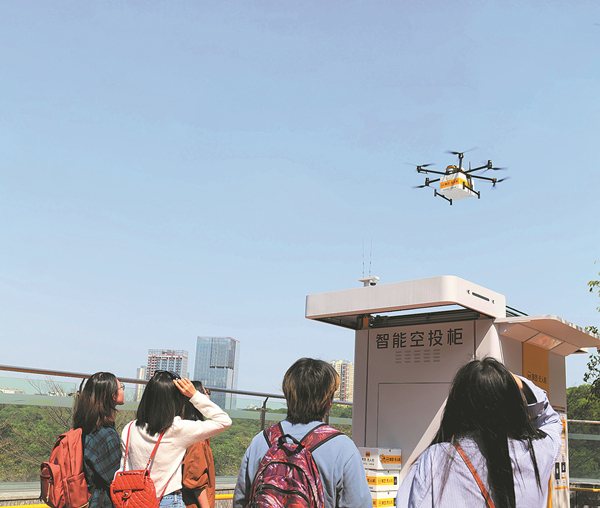Deliveries ready to fly using UAVs

An unmanned aerial vehicle delivers Meituan packages in Shenzhen, Guangdong province, in February. [CHEN WEN/CHINA NEWS SERVICE]
If you have ever ordered a cup of hot coffee or tea to be delivered in the winter, chances are it was already cold when it arrived due to the frigid weather.
Wouldn't it be great if, instead of arriving from a delivery person, you received it in half the time from an unmanned aerial vehicle (UAV) — commonly known as a drone — right outside your window, wrapped in thermal packaging?
It's all happening now, as several Chinese cities, including Shenzhen in Guangdong province, Shanghai and Hangzhou in Zhejiang province, began using UAVs for deliveries. Technology is boosting consumption faster than expected.
In Shenzhen, a city boasting more than 1,300 UAV companies such as DJI, the industrial output of the city's UAVs reached 75 billion yuan ($10.9 billion) last year, accounting for 70 percent of the country's total industrial output in the field of UAVs.
Meituan was among the first batch of tech companies to start UAV trials in the city. As of the end of last year, unmanned delivery service has been serving 18 communities in Shenzhen and completed nearly 120,000 orders.
"Technologies like UAVs are expected to play a greater role in distribution within a three-kilometer consumption area," said Mao Yinian, head of Meituan's UAV business.
According to Mao, the drone can fly at a height of less than 120 meters at a flight speed of 10 meters per second. It can carry a maximum load of 3 kilograms and stay airborne for up to 20 minutes.
"In the next five to 10 years, the cost of unmanned deliveries will be equal to that of human deliveries, and the efficiency and user experience brought by UAVs will be greatly improved," he said.
Earlier this year, Meituan's UAV solutions for urban low-altitude logistics were approved by the Civil Aviation Administration of China. With the move, the online takeaway company is qualified to start its commercialization business for UAVs.
In Wenzhou, Zhejiang province, unmanned deliveries are no longer limited to vehicles as the unmanned aerial drones of SF Express are transporting boxes of bayberries from a mountaintop to a delivery station located far below.
For local farmers, the delivery of bayberries has always been a problem, as such fruits easily bruise during land transport. While it previously took over two hours to deliver the fruit, it now takes only eight minutes using aerial drones, according to SF Express.
He Xiongsong, executive president of Estar Capital, pointed out that it will take time for the country's unmanned delivery industry chain to grow and reduce costs.
"One of the main barriers is that the costs of core components such as light detection and ranging, or lidar, are relatively high. How to reduce such costs in a cost-effective industry remains a challenge," said He.



 Print
Print Mail
Mail

